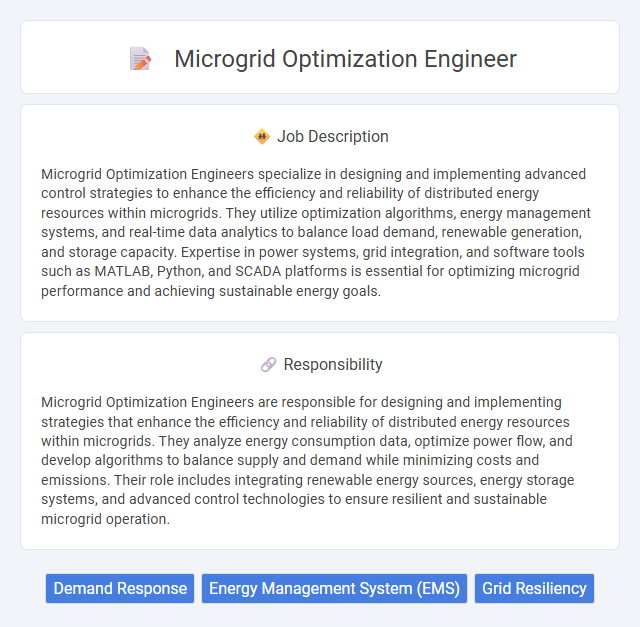
Microgrid Optimization Engineers specialize in designing and implementing advanced control strategies to enhance the efficiency and reliability of distributed energy resources within microgrids. They utilize optimization algorithms, energy management systems, and real-time data analytics to balance load demand, renewable generation, and storage capacity. Expertise in power systems, grid integration, and software tools such as MATLAB, Python, and SCADA platforms is essential for optimizing microgrid performance and achieving sustainable energy goals.
Individuals with strong analytical skills and a passion for sustainable energy solutions are likely suitable for a Microgrid Optimization Engineer role. Candidates comfortable with complex problem-solving and data-driven decision-making may find this job aligns with their abilities and interests. Those lacking experience in energy systems or optimization algorithms might face challenges adapting to the technical demands of the position.
Qualification
A Microgrid Optimization Engineer requires a strong background in electrical engineering, renewable energy systems, and power grid integration. Expertise in optimization algorithms, energy management software, and data analytics tools like MATLAB, Python, or SCADA is essential. Advanced knowledge of control systems, energy storage technologies, and grid stability enhances the ability to design and optimize efficient, sustainable microgrid solutions.
Responsibility
Microgrid Optimization Engineers are responsible for designing and implementing strategies that enhance the efficiency and reliability of distributed energy resources within microgrids. They analyze energy consumption data, optimize power flow, and develop algorithms to balance supply and demand while minimizing costs and emissions. Their role includes integrating renewable energy sources, energy storage systems, and advanced control technologies to ensure resilient and sustainable microgrid operation.
Benefit
Microgrid Optimization Engineers likely improve energy efficiency and reduce operational costs through advanced algorithm development and system integration. Their work probably enhances grid reliability and supports sustainable energy adoption by optimizing distributed energy resources. Companies may benefit from decreased carbon footprints and increased resilience to power disruptions due to these engineers' specialized skills.
Challenge
Microgrid Optimization Engineer roles likely involve the challenge of balancing complex energy sources and loads to achieve efficient, reliable power delivery. The position probably requires navigating uncertainties in renewable generation and demand forecasting to optimize system performance. Engineers may face difficulties integrating new technologies while maintaining grid stability and cost-effectiveness.
Career Advancement
Microgrid Optimization Engineers leverage advanced algorithms and real-time data analytics to enhance energy efficiency and reliability in decentralized power systems. Mastery in renewable energy integration, grid dynamics, and energy storage technology drives innovation and leadership opportunities in smart grid development. Career advancement often leads to strategic roles in energy management, project leadership, and sustainable infrastructure planning.
Key Terms
Demand Response
Microgrid Optimization Engineers specializing in Demand Response develop strategies to balance energy consumption and generation within distributed energy resources, enhancing grid reliability and reducing costs. They utilize advanced algorithms and real-time data analytics to optimize load shifting, peak shaving, and energy storage integration in microgrids. Expertise in smart grid technologies, IoT sensing, and predictive modeling is essential for maximizing demand response potential and supporting sustainable energy management.
Energy Management System (EMS)
Microgrid Optimization Engineers specialize in designing and enhancing Energy Management Systems (EMS) to efficiently coordinate distributed energy resources, including solar panels, battery storage, and diesel generators. They utilize advanced algorithms and real-time data analytics to optimize load balancing, reduce energy costs, and improve reliability within microgrids. Proficiency in EMS software platforms such as SCADA and DERMS enables these engineers to implement adaptive control strategies that maximize renewable integration and grid resilience.
Grid Resiliency
Microgrid Optimization Engineers design and implement advanced control algorithms to enhance grid resiliency by integrating renewable energy sources, energy storage systems, and demand response strategies. They analyze real-time grid data and forecast load profiles to optimize microgrid performance, ensuring reliable power supply during outages or disruptions. Their work reduces dependency on centralized grids and supports sustainable, resilient energy infrastructure in critical facilities and communities.
 kuljobs.com
kuljobs.com